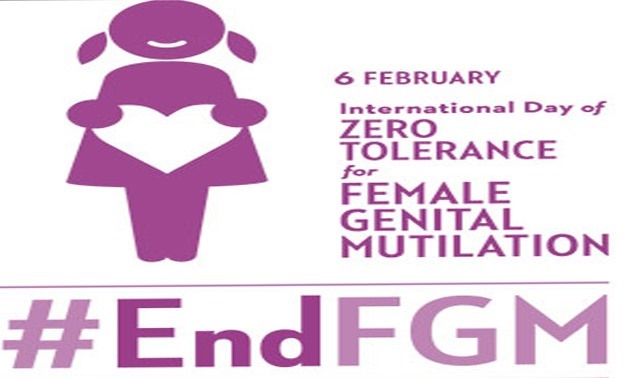
End FGM Logo - Photo Courtesy of United Nations website
CAIRO – 8 February 2018: On the International Day of Zero Tolerance for Female Genital Mutilation, the United Nations released a statement praising Egypt’s efforts to address the issue of Female Genital Mutilation (FGM).
The United Nations is committed to continue working jointly with the Egyptian Government towards this objective. The UN stressed the importance of collectively eliminating such harmful practices and more broadly creating a safer environment for young women and girls in Egypt.
“The United Nations in Egypt recognizes the ongoing efforts of the Government, which has led to the reduction of FGM in the younger age groups (15-17 years) by more than 13 percent since 2008. Moreover, the adoption of a National FGM Strategy 2016-2020 and most importantly, the recent decision to amend and stiffen the law criminalizing FGM, were critical steps taken to address FGM”, the statement read.
The statement hailed Egypt’s efforts, noting, “it’s clear that it is possible for rates of FGM to drop significantly when joint efforts are exerted by different parties, including governments, international organizations, local communities and medical professionals to raise awareness about the negative consequences of FGM/C, and when the legislative response is to criminalize such harmful practices.”
Minister of Health Ahmed Emad presented six steps to eliminate this crime by 2030:
1. Criminalization of FGM in the Penal Code, punishable by severe imprisonment.
2. The Attorney General shall prepare a book to record these crimes as a reference in the investigation of female circumcision incidents.
3. The Minister of Health issued a circular book in October 2017, in which hospitals are required to inform the police when they receive female circumcision cases.
4. To require the Ministry of Health’s sectors to carry out training programs and educational programs on the law, covering the penalties and negative consequences of circumcision.
5. Implementation of the Supreme Council of Universities’ approval in 2017 to add an educational curriculum against the crime of female genital mutilation within the curriculum of obstetrics students in medical school programs.
6. Commitment of all ministries and agencies to integrate the curriculum against female genital mutilation within their training and service programs.
According to a study conducted by the World Health Organization (WHO), “The Demographic and Health Survey in Egypt in 2000 showed that 97 percent of married women included in the survey had experienced female genital cutting (i.e. FGM).”
Over 94 percent of married women were exposed to genital cutting, and 69 percent of those women agreed to the procedure being carried out on their daughters. Additionally, a pilot study by the Health Insurance Organization showed that 41 percent of female students in primary, preparatory and secondary schools had undergone genital cutting.
Another study by the Egyptian Ministry of Health and Population released in 2003 reported that Female Genital Mutilation (FGM) is a widespread practice in Africa, the Middle East and regions known for heavily adhering to outdated traditions and customs. The practice consists of having the external part of female genitals cut as a method to curb sexual desire. The fact is that regions with the highest numbers of FGM are not only ignorant of the risks of FGM, they are also ignorant of sexual health, psychological health and more.

Comments
Leave a Comment